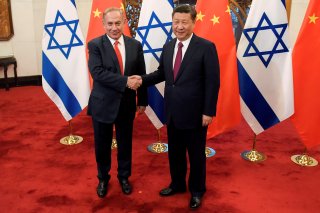Israel and the China Connection
Israel has been forced into the crosshairs of the brewing U.S.-China Cold War.
No less significant, Israel offers China a gateway to Europe, enhancing not only China’s trade with Europe but also China’s political influence in the continent. Israel is a key transportation node to Europe through Greece’s Piraeus port and Italy’s Trieste port, both of which have become footholds for fast trade moving of Chinese goods to the heart of the EU. These historic gateway ports to Europe could also sharpen China’s political edge in EU politics by enabling Peking to drive a wedge among EU members and in the EU-U.S. alliance. For example, European landlocked countries such as Hungary, Serbia, Austria, Slovakia, Slovenia, Switzerland, and Czech Republic may well favor trade with China given their proximity to Trieste port as a commercial hub.
To be sure, Washington is justifiably worried about Chinese investments in Israel, which has acknowledged this concern. Jerusalem has taken steps to monitor and censor Chinese investments deemed critical to the national security of both Israel and the United States. In October 2019, the Israeli government established a regulatory mechanism to monitor foreign investment and the acquisition of sensitive dual-use technologies. The Knesset is also preparing a draft bill granting the government, especially the National Cyber Directorate, broad powers to examine foreign investments in technology and cyber. However, the mechanism has fallen short of American expectations given that it plays an advisory rather than a censorship role.
No doubt, Israel will defer to American requests. But Israel has been forced into the crosshairs of the brewing U.S.-China Cold War. Although Jerusalem has deeper and stronger relations with Washington than Peking, both capitals are vital to Jerusalem’s economy and prosperity. Clearly, Israel is facing a serious national security dilemma actually splitting the country into two camps. Whereas one camp, including the military, prefers reinforcing U.S.-Israel relations, the other camp prefers a balanced approach with both countries.
On closer examination, however, part of Israel’s dilemma and America’s problems lies with Washington’s lack of a strategy counteracting China’s systematic and comprehensive strategy of becoming the Middle Kingdom. Washington has pursued a pressure policy towards China’s strategy based more on an ad hoc tactics. Israel, more than any other country, is being blamed and pressured because it has a national brainpower far exceeding its popular demography. Washington cannot pursue a pressure policy with its allies and partners without creating an alternative to Chinese investments. It also cannot look at Chinese investments in Israel in isolation to other investments in the Middle East and Europe. China today is the largest trading partner with Saudi Arabia and the Gulf Cooperation Council. Saudi Arabia has inducted Chinese language into its educational curricula. Washington, along with European capitals, has neglected the historic importance of the Piraeus and Triesta ports, which was crucial to the Austro-Hungarian Empire. It behooves Washington to revitalize its strategic alliances and cooperation with its allies and partners, beginning with Europe then the Middle East and Asia. Then Washington needs to design a concerted strategy of global investment grounded in American ingenuity and competitiveness, recognizing the economic needs of its allies. Last but not least, Washington has to reverse tack and resume talking softly and carrying a big stick.
Robert G. Rabil is a professor of political science at Florida Atlantic University. The views expressed in the article are his own. He can be reached at @robertgrabil.

